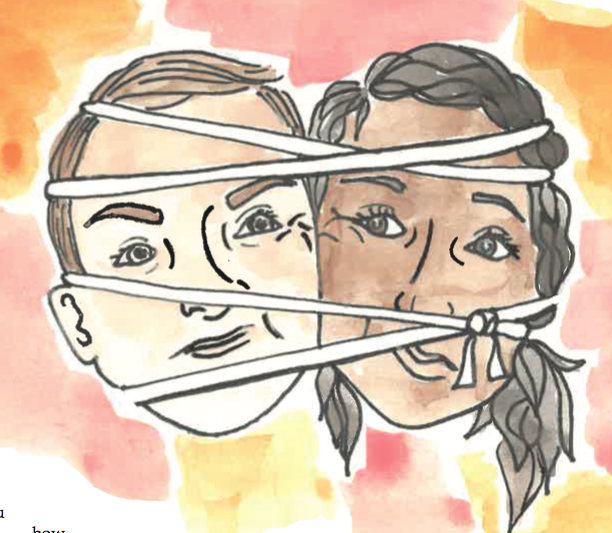
By Meg Friel
Executive Editor
Living on campus, I keep a curious eye on a number of relationship “types.” There’s the couple that keeps a safe distance: grab breakfast in Alliot together before going to class, spending the afternoon with their friends, or spending some time slaving over study notes in McCarthy. Then there’s the “attached at the hip” type. After dating for a few months, the couple feels as though they can’t live without each other. They’ve surrounded their lives with their partner as they see their friends start to fade away. When you live on the same, relatively small, campus, share the same friends, maybe even the same classes, how do you keep a sense of self in a relationship?
Codependency is a term often used in relationships, even platonic, when describing one partner relying on another person for who you are, said therapist Steve Langehough, who works in Burlington, Vt. Codependency can be seen in a constant need for communication with your partner, isolating your friendships, and only revolving your life around your partner – losing yourself in your partner.
Is this you?
Think: do you feel a constant need to text your partner? Do you feel like you can’t live without your partner?
Do you feel like you have no one to turn to besides your partner? “I love being around you” can soon turn to “I can’t live without you” if not careful.
Codependency is one end of the spectrum, opposite to independence. Interdependency means being able to maintain your independence but being able to grow and benefit from your partner.
Interdependency can look like being able to talk to your partner about how
you’re feeling or what you’re going through, but not emotionally exhausting them. Being able to maintain a relationship with your partner, but feeling fulfilled in your life outside of that relationship.
“Codependency requires you for my existence. Interdependency says, ‘I’m a healthy human being. I matter, I count, I have strength, but I can accomplish more with you,” Langehough said. “I’m an acceptable person without you, but I’m even better with you. Each of us can accomplish more individually when we’re with each other, but even if we aren’t with each other, we each still count.’”
Codependency becomes apparent when at least one of the individuals in the couple feels as though they can’t live without the other. This, says Langehough, stems from fear.
“Fear takes many shapes,” Langehough said. “It can be fear of being alone, it can be fear of not being attracted to anyone else, it can be fear of not being important. That fear can count for low self esteem, ‘I’m nothing without you.’”
One way to recognize where one stands in their relationship is to look at “intimacy styles,” said visitng assistant professor of psychology Sarah Nosek. An intimacy style is a measurement of where your capacity for intimacy or successful relationships lies. This is determined with a 6-part questionnaire that will result in one of four intimacy styles, ranging from from isolation to merger.
“Intimacy is sort of the one you’re going for, you’re in good shape, you’re able to relate to your partner, but you also have a sense of your own identity and willing and able and enjoy sharing,” Nosek said. “Merger is where you’re putting the needs of your partner, or whoever you’re intimate with, above your own. This is the identity type where you can get lost or lose yourself.”
The added mixture of stress from classes, worry over the future, and the task of trying to find yourself can make codependency at our college age all the more difficult.
“I think part of the difference is, as someone is growing, you’re trying to find yourself,” said Active Minds Advisor Catherine Welch. “You’re separating yourself potentially from the beliefs you grew up with, and you’re trying to figure out what you believe, and what you stand for. You’re figuring out these things for the first time, and that’s a lifelong journey at any age.”
At any age, however, maintaining independence is necessary to stay out of the bounds of codependency. What happens if your partner leaves? Langehough asks. “What if I don’t have the sense of independence, that I can be complete without my partner, that allows me to be a better partner?” Lange- hough said. “Without that independence, if something happens to my partner, then mental illness and mental breakdowns can occur.”
Langehough shares some of the ways that a couple may approach addressing their codependency and how to correct it.
“The first step is saying, we don’t want to be like this anymore,” Langehough said. “Then it’s, okay, if we don’t know how to do this on our own, who can we ask to help us. Let’s do some research and see if we can find some strategies and steps. There are some couples who are in that point of codependence where, in order to get healthy, really require a third person to step in.”
This advice can apply for all kinds of relationships, even platonic.
“You might turn to a friend and kind of want to work through all of your problems because you feel comfortable with them, but I think there is that chance of overburdening them,” said Welch. “It’s important to feel like you have friends to turn to, but also for the friends to be able say, ‘I feel like it would be beneficial for you to really go speak with a professional or someone that could help you that’s beyond my expertise.’

